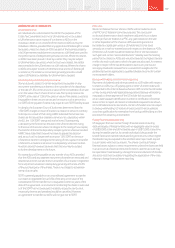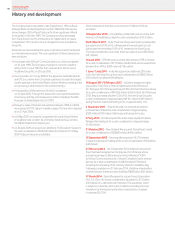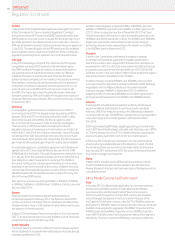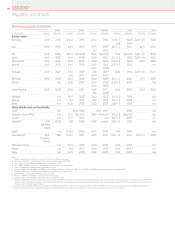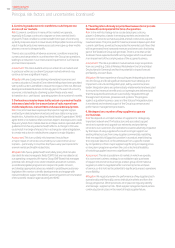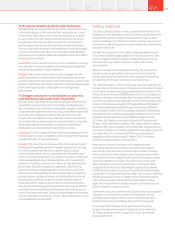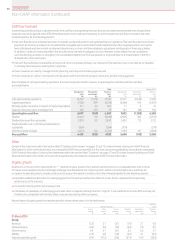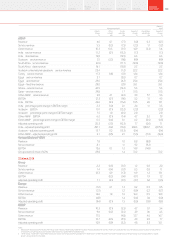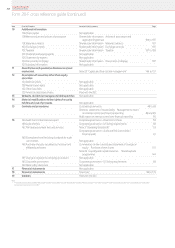Vodafone 2014 Annual Report Download - page 201
Download and view the complete annual report
Please find page 201 of the 2014 Vodafone annual report below. You can navigate through the pages in the report by either clicking on the pages listed below, or by using the keyword search tool below to find specific information within the annual report.
10. We may not satisfactorily resolve major tax disputes.
Risk: We operate in many jurisdictions around the world and from time
to time have disputes on the amount of tax due. In particular, in spite
of the positive India Supreme Court decision relating to an on-going
tax case in India, the Indian Government has introduced retroactive
tax legislation which would in effect overturn the Court’s decision
and has raised challenges around the pricing of capital transactions.
Such or similar types of action in other jurisdictions, including changes
in local or international tax rules or new challenges by tax authorities,
may expose us to signicant additional tax liabilities which would affect
the results of the business.
Assessment: This is a risk that could occur in any market but is currently
more relevant for emerging markets where the disputed tax payable
and any related penalties could be signicant.
Mitigation: We maintain constructive but robust engagement with
the tax authorities and relevant government representatives, as well
as active engagement with a wide range of international companies and
business organisations with similar issues. Where appropriate we engage
advisors and legal counsel to obtain opinions on tax legislation
and principles.
11. Changes in assumptions underlying the carrying value
of certain Group assets could result in impairment.
Risk: Due to the substantial carrying value of goodwill, revisions to the
assumptions used in assessing its recoverability, including discount
rates, estimated future cash ows or anticipated changes in operations,
could lead to the impairment of certain Group assets. While impairment
does not impact reported cash ows, it does result in a non-cash
charge in the consolidated income statement and thus no assurance
can be given that any future impairment would not affect our reported
distributable reserves and therefore, our ability to make dividend
distributions to our shareholders or repurchase our shares.
Assessment: This risk is relevant for the markets facing tough economic
conditions and increasing competition; where an impairment may have
a signicant impact on reported earnings.
Mitigation: We review the carrying value of the Group’s property, plant
and equipment, goodwill and other intangible assets at least annually,
or more frequently where the circumstances require, to assess
whether carrying values can be supported by the net present value
of future cash ows derived from such assets. This review considers the
continued appropriateness of the assumptions used in assessing for
impairment, including an assessment of discount rates and long-term
growth rates, future technological developments, and the timing
and amount of future capital expenditure. Other factors which may
affect revenue and protability (for example intensifying competition,
pricing pressures, regulatory changes and the timing for introducing
new products or services) are also considered. Discount rates are
in part derived from yields on government bonds, the level of which
may change substantially period to period and which may be affected
by political, economic and legal developments which are beyond our
control. For further details see “Critical accounting judgements and key
sources of estimation uncertainty” in note 1 “Basis of preparation” to the
consolidated nancial statements.
Currency related risks
The Group continues to face currency, operational and nancial risks
resulting from the challenging economic conditions particularly in the
Eurozone. We continue to keep our policies and procedures under
review to endeavour to minimise the Group’s economic exposure and
to preserve our ability to operate in a range of potential conditions that
may exist in the future.
Our ability to manage these risks needs to take appropriate account
of our needs to deliver a high quality service to our customers, meet
licence obligations and the signicant capital investments we may
have made and may need to continue to make in the markets
most impacted.
While our share price is denominated in sterling, the majority of our
nancial results are generated in other currencies. As a result the
Group’s operating prot is sensitive to either a relative strengthening
or weakening of the major currencies in which we transact.
The “Operating results” section of the annual report on pages 40 to 45
sets out a discussion and analysis of the relative contributions from each
of our regions and the major geographical markets within each, to the
Group’s service revenue and EBITDA performance. On a management
basis our markets in Greece, Ireland, Italy, Portugal and Spain continue
to be the most directly impacted by the current market conditions and
in order of contribution represent 12% (Italy), 6% (Spain), 3% (Ireland
and Greece combined) and 2% (Portugal) of the Group’s EBITDA for
the year ended 31 March 2014. An average 3% decline in the sterling
equivalent of these combined geographical markets due to currency
revaluation would reduce the Group’s EBITDA by approximately
£0.1 billion. Our foreign currency earnings were for the year ended
31 March 2014, diversied through our 45% equity interest in Verizon
Wireless (‘VZW’), which operates in the United States and generates its
earnings in US dollars. Our interest in VZW, which was equity accounted
to 2 September 2013, contributed 40% of the Group’s adjusted
operating prot for the year ended 31 March 2014. Our interest
in VZWwas disposed of on 21 February 2014.
We employ a number of mechanisms to manage elements
of exchange rate risk at a transaction, translation and economic
level. At the transaction level our policies require foreign exchange
risks on transactions denominated in other currencies above certain
de minimis levels to be hedged. Further, since the Company’s sterling
share price represents the value of its future multi-currency cash
ows, principally in euro and to a lesser extent sterling, the Indian
rupee and South African rand following the disposal of our interest
in VZW, we aim to align the currency of our debt and interest charges
in proportion to our expected future principal multi-currency cash ows,
thereby providing an economic hedge in terms of reduced volatility
in the sterling equivalent value of the Group and a partial hedge
against income statement translation exposure, as interest costs will
be denominated in foreign currencies.
In the event of a country’s exit from the Eurozone, this may necessitate
changes in one or more of our entities’ functional currency and
potentially higher volatility of those entities’ trading results when
translated into sterling, potentially adding further currency risk.
A summary of this sensitivity of our operating results and our
foreign exchange risk management policies is set out within note
23 “Capital and nancial risk management” to the consolidated
nancial statements.
199Overview Strategy
review Performance Governance Financials Additional
information


